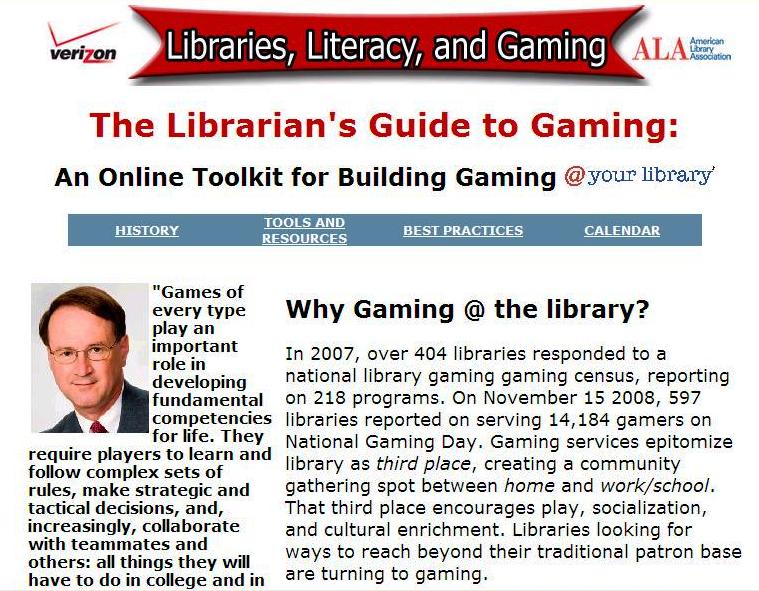For anyone who showed an interest in using video games for educational learning, there seems to be a plethora of information around about libraries, schools and gaming. You may have to refer to one or more of these sites to get gaming on your school agenda. Here is a selection of those sites.
The American Library Association has a website named ‘The Librarian’s Guide to Gaming’, which is ‘an online toolkit for building gaming @ your library. There is a lot of information on the site which includes ‘tools and resources’, ‘best practice’ and ‘evaluation’.
Helen Boelens recently let IASL members know about some more video game research that was being carried out. She says, “The research is being carried out by a researcher at the CLU (Centrum Leermiddelen Studie Utrecht – Centre for educational tools Utrecht), together with Kennisnet, which is a Dutch national foundation which supports the use of ICT in education in the Netherlands. The CLU is affiliated with the University of Utrecht, a university which has a strong faculty of education. The study which is being carried is about the effect of serious gaming on young people of upper secondary school age (16 years of age and older) and how these games can be used as educational tools, as part of their education. This research is presently taking place. A final report will be published when the research has been completed.”
Some other discussions about using computer games in schools include Computer games explore social issuesby Kara Platoni. “Students have to win PeaceMaker, a simulation of the Middle East peace process, twice — once while playing as the Israeli prime minister and once as the Palestinian president.”
Patricia Edgar (the founding Director of the Australian Children’s Television Foundation) and Don Edgar have written a paper on the topic of Television, Digital Media and Children’s Learning for the Victorian Curriculum and Assessment Authority which promotes the use of all types of media in learning and teaching.
School change and video gamesby Mark Wagner, Ph.D. looks at school change through video games.
Learning to game and gaming to learn: videogames in education is a wiki with a lot of links to research that has focused on the relationship between video games and school learning.
Videogames as learning enginesby David Warlick is another presentation that looks at the correlation between video games and learning.
And don’t forget the State Library of Victoria is offering a chance to find out what gaming is all about at an evening of interactive play and mini-tournaments. Discover a range of video games and consoles, and meet game experts from Dissecta. It will be held on Tuesday 7 April (school holidays for Victoria) from 6-7.30pm at the State Library, in Experimedia. The session is free, but bookings are required. Please click this link to book in.

